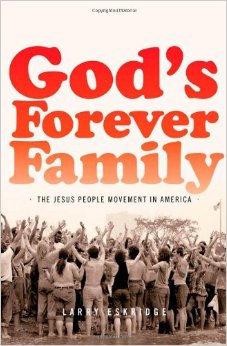A Brief Book Summary from Books At a Glance
A “Bonus” Summary-Review by Michael Plato
Though born in the 1970s, I never really knew the decade. My personal comprehension being no more than a few vague visual impressions and emotions. One of these early memories is of the “Jesus Freak.” Probably it came from the television, intermingling as it does with the images of Jimmy Carter and Sesame Street. Since that era occasional mention has been made of the Jesus Freak, typically as a side note in popular culture retrospectives. It is a figure not so much to be studied or explained, but merely to be looked at, as one might a sideshow at a carnival. It sends out mixed or confused signals. On the one hand it represents the free-willed, narcotic-experimenting, counter-cultural, back-to-nature ethos of the hippie movement; on the other hand, it embodies the values and beliefs of the straight laced, church attending, Bible thumping conservative Christians. How did such a strange hybrid come about? Where did it go?
For the first time we may have something of an answer. God’s Forever Family: The Jesus People Movement in America is the first major monograph to document this curious historical phenomenon. Not only is it a work which provides startling comprehensiveness, primarily through biography and ethnographic research, but it calculates this ephemeral movement’s lasting impact on the wider world of the church in America and the world.
Its author, Larry Eskridge, is on staff at the Institute for the Study of American Evangelicals at Wheaton College. This study represents years of research Eskridge did outside his mandated work at Wheaton, and includes not only heavy archival work, but also the surveying of over 800 participants in the movement. (Much of this later work is conveniently laid out in a clear and convenient appendix.) That this movement peaked over forty years ago (1969‒1972), was largely ad hoc, and left very little in terms of institutional record, had to have been a significant challenge and is a testament to the author’s diligence and the advantages of web based research methods….
[To continue reading this summary, please see below....]The remainder of this article is premium content. Become a member to continue reading.
Already have an account? Sign In
